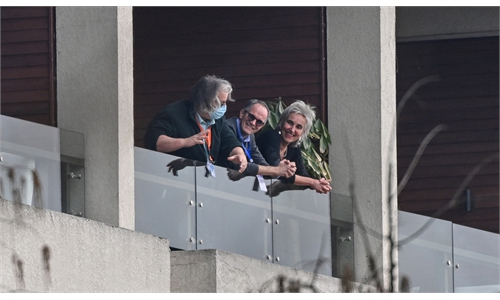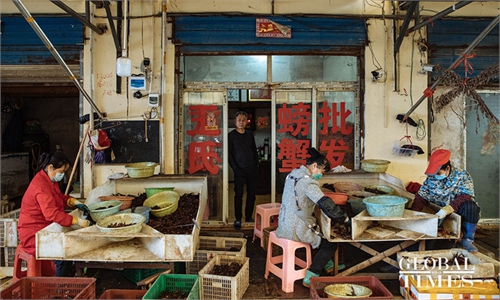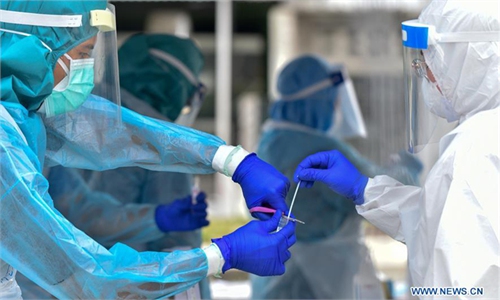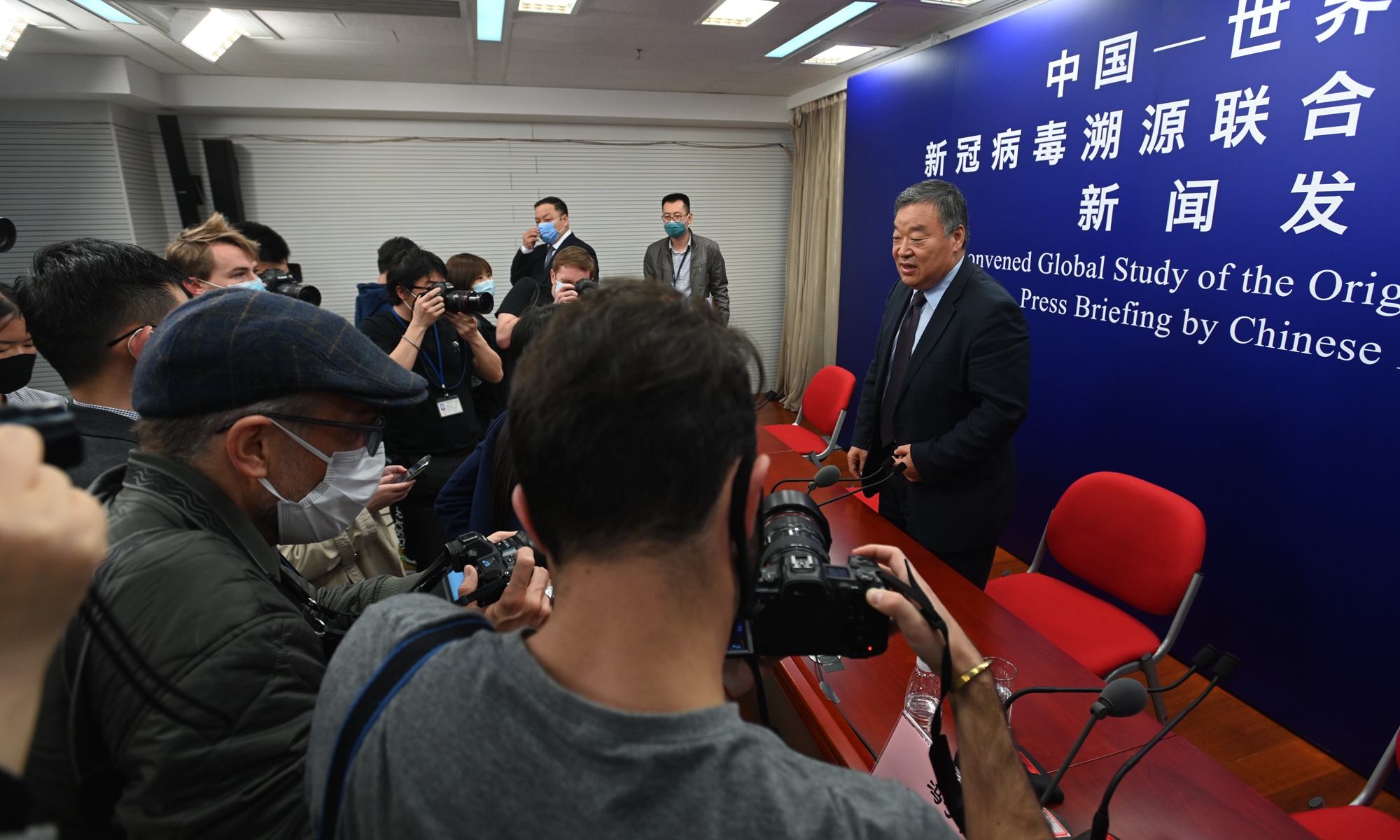
Liang Wannian, team leader of the Chinese side of the WHO-China joint expert team, takes questions on the joint report on coronavirus origins at Wednesday's press conference. Photo: VCG
After a joint WHO-China report on tracing the origins of COVID-19 dismissed the possibility of the virus being leaked from a lab - a conspiracy that serves as ammunition for Western media and politicians to disparage China, a number of China bashers questioned the report's impartiality and even asked for a "second stage" investigation that implies a return visit to China.
Chinese scientists from the WHO-China joint team brushed aside those allegations on Wednesday, including the accusation that WHO experts had difficulty in accessing raw information in Wuhan, the question on whether the report was delayed due to political pressure, and criticism of China exerting political pressure on the body.
WHO experts were granted the same data access as their Chinese counterparts in generating this report, which requires time and negotiations from both sides to compile, said the team leader of the Chinese side of the WHO-China joint expert team at Wednesday's press conference.
The global investigation on the virus origin is the direction that Chinese scientists believe the next stage probe should be. Yet they urged certain countries, especially the US, to stop putting political pressure on this work and on scientists, because if such an investigation is politically guided, there won't be any fair and scientific outcome.
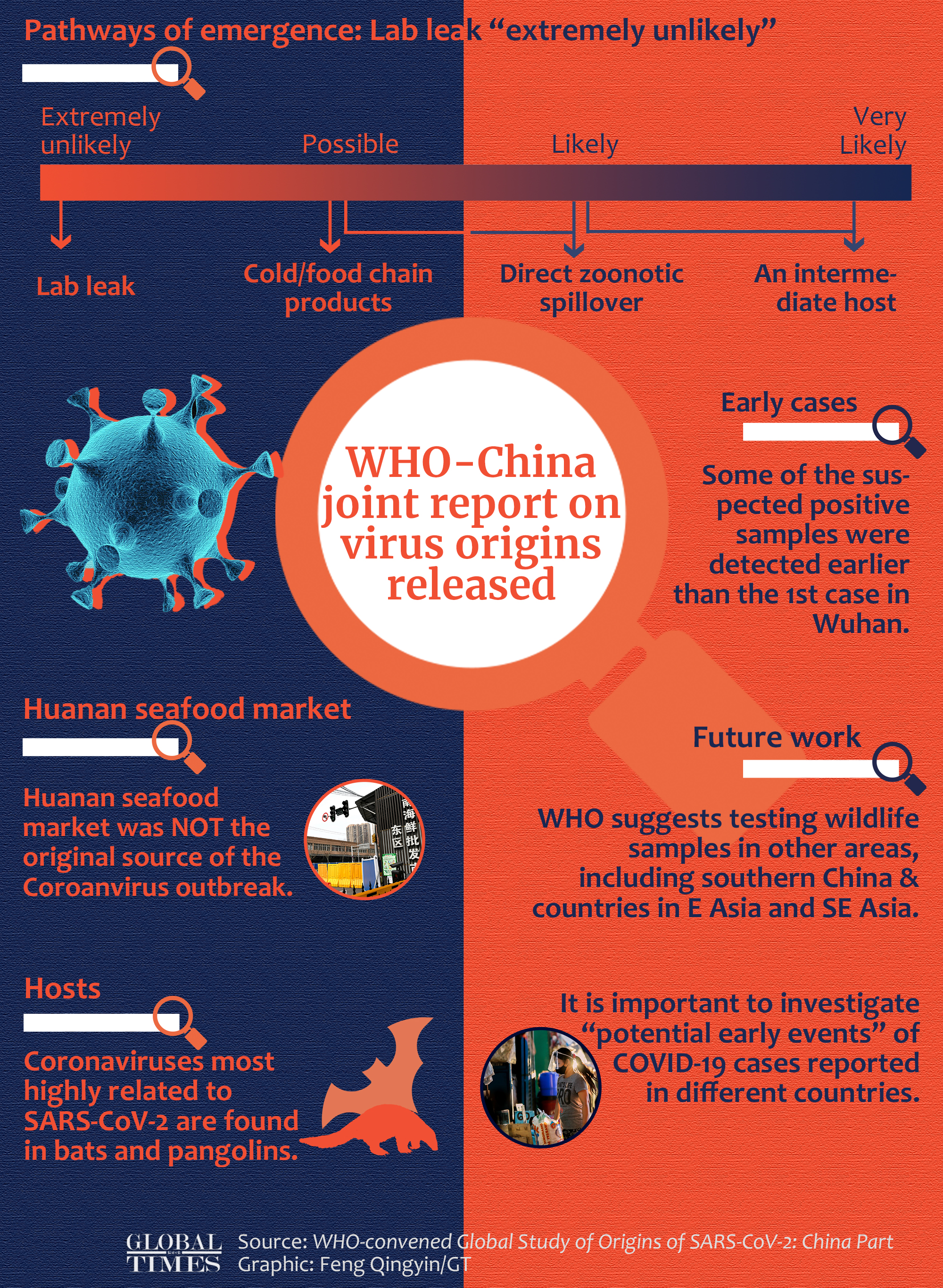
Highlights from #WHO-China joint report on coronavirus origins: -A lab leak was "extremely unlikely" -Huanan seafood market was NOT the original source of the outbreak -It's important to investigate "potential early events" of COVID-19 cases in different countries Graphic: Feng Qingyin/GT
A joint study into the origins of COVID-19 by China and the WHO was published on Tuesday, in which it claimed the lab leak theory as "extremely unlikely," and pointed to a possible path of transmission between animals and humans, and transmission through frozen food.
Right after the publication, a group of 14 countries, including the US, Australia, Canada, and the Czech Republic, raised concerns over the report released by the WHO on Tuesday into the origin of the coronavirus, citing delays and a lack of full access to data.
Liang Wannian, team leader of the Chinese side of the WHO-China joint expert team, shrugged off the "delaying" accusation at a Wednesday press conference, saying that both Chinese and foreign experts upheld the principle of "quality comes first."
"Every sentence, every conclusion, every piece of data" had to be verified by both sides before it could be released, said Liang, noting that it is the scientists' desire to make the report more scientific and complete, and that has caused the delay.
As for the "withholding data" accusation made by the Western governments' statement, Liang said that there's no such thing as perfect data, yet China has done what it could to collect the data and worked together with foreign experts.
Observers see the Western media and politicians' accusation as "presumption of guilt" and politically driven. If the investigation is politically guided, there won't be any fair and scientific outcome, said scientists, calling for first stage probes in other countries in order to have a clearer picture of the virus origins.
Zeng Guang, chief epidemiologist from China CDC, believes those who signed the statement are blinded by their political bias. "Why are those people, who did not even come to investigate in China, barking outside the wall? I don't feel like they are speaking for real science on this matter," Zeng told the Global Times on Wednesday.
The epidemiologist said that the report was compiled by scientists who carried out a real investigation in Wuhan, and if anyone for purely political purposes throws mud at this report, it will be pathetic, and "even a blasphemy for science."
The White House on Tuesday urged the WHO to take additional steps to determine the origins of COVID-19. "There's a second stage in this process that we believe should be led by international and independent experts," the White House press secretary, Jen Psaki, told reporters.
Xin Qiang, a deputy director of the Center for US Studies at Fudan University, said that the virus may have many origins and some countries have reported earlier cases than China. "Why was the investigation only launched in China? Are other countries also in need of an investigation?" he asked.
The US move was made purely out of political purposes. It has put China in the dock and brought charges, such as being the source of the outbreak and poor response to the crisis, Xin said. "Hence, no matter how many rounds of investigations the US calls for, China would not be able to clear its name."
Zeng further noted that the US Fort Detrick Laboratory should also be subjected to scrutiny when it comes to virus origin tracing. "The lab leak theory is extremely unlikely in China, but it doesn't mean that it's unlikely somewhere else," said the epidemiologist.
Sow discord between China and WHO
Shortly before the report's release, WHO head Tedros Adhanom Ghebreyesus said on Tuesday that the investigation was "not extensive enough" and experts had difficulties to access raw information during their four-week visit to Wuhan in January, according to a report of the Guardian.
Tedros also said there should be continued examination of the theory that the virus escaped from Wuhan Institute of Virology laboratory, even though the report deemed it "extremely unlikely" as a source of the pandemic.
His words were widely quoted by Western media, such as BBC, which directly linked the WHO head's lab statement with China, and made a headline: "More work needed to rule out China lab leak theory, says WHO."
The anonymous expert close to the joint team told the Global Times that some of Tedros' statements have drawn a lot of attention in the Western media, but in his opinion, Tedros has been promoting the traceability investigation and a further probe will be a natural course, since the joint study in Wuhan has not reached a definitive conclusion.
"He is unlikely to be in favor of China, as the WHO, a neutral international organization, must remain objective and independent. There is not really enough data, so it is necessary to carry out investigations in more countries, such as the US and in Europe," the expert said. "China has always supported the work of the WHO and should be alert to the Western media's attempt to politicize Tedros's comments, as it aims to damage the relationship between the WHO and China."
Lü Xiang, a research fellow on US studies at the Chinese Academy of Social Sciences in Beijing, said he suspects that Tedros was under pressure from the US. Washington has been keen on stirring up public opinion that China is culpable for the pandemic. Thus, it spares no effort to pressure WHO to make a conclusion in its favor.
Turn to other states
At the Wednesday conference, Chinese experts agreed that the report doesn't mark the end of virus tracing work and they outlined a plan of what to do next.
Liang outlined several aspects for next-stage virus tracing work, which includes expanding a global unified database to include molecular and gene sequencing, and continue to look for possible early cases of the outbreak more widely around the world.
He stressed the need to further understand the role of cold chain and frozen food in the process of virus transmission.
Liang said China would continue to try to trace the origins of COVID-19, but the Chinese part of the joint research had been completed, and attention should now turn to other countries.
The WHO report also suggests that animals in livestock farms in Southeast Asia could be "linked to early human cases" and that further study on these farms is needed.
Yet this suggestion was ignored by Western media, which only focused on how this report failed to hold China as the culprit of the pandemic.
An increasing amount of early data indicates that the outbreak of COVID-19 in other countries occurred earlier than their official reports stated, said the anonymous expert, noting that therefore, in the spirit of science and responsibility to the global public, and in order to get deeper into the virus origins, the investigation should be broadened, as the existing evidence cannot conclude that the virus originated in China, and there is now a large amount of evidence to prove the possibility of cold chain transmission.



